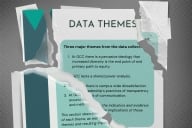You have /5 articles left.
Sign up for a free account or log in.
Back in May, the Reverend John Jenkins, president of the University of Notre Dame, declared in The New York Times that the question of whether or not to open the university to face-to-face instruction was a moral one.
In his words, not attempting to open “would risk failing to provide the next generation of leaders the education they need and to do the research and scholarship so valuable to our society.”
Having invoked the necessity of preparing our country’s future leaders in May, Father Jenkins decided to fly to Washington, D.C., in late September and participate in the Rose Garden ceremony announcing Judge Amy Coney Barrett, a former Notre Dame law professor, as the next nominee for the Supreme Court.
Father Jenkins, who, like most of the rest of the attendees, was unmasked and in close proximity to others, returned home with a case of coronavirus, as it’s increasingly looking like the announcement and a related indoor reception have become a superspreading event.
Meanwhile, Notre Dame students who participated in off-campus parties where masks were not worn are going through a campus disciplinary process for violating university standards.
Eighteen other Notre Dame faculty members joined Father Jenkins as the event and, as of reporting on Saturday, were awaiting the results of their coronavirus tests.
I do not have an opinion if Father Jenkins should resign, as a petition signed by a couple hundred Notre Dame students calls for. That is a community issue, and I’m not a member of Notre Dame’s community.
I will say that Father Jenkins has failed a moral test of leaders in the most spectacular way imaginable by excusing himself from the standards he enforces over others. One wishes there were not so many examples of this among our leadership class, but for this all-too-common failing to be illustrated so starkly by a priest and university president who claimed the chief mission of his institution is a moral one is stark and distressing.
It is an illustration of a trend in institutional leadership, where achieving high office comes not with heavy responsibilities and the need to set an example, but is instead coupled with an excuse from the concerns of regular people. Father Jenkins was very clear to the Notre Dame community about the need to behave responsibly in order to protect the operations of the institution, and equally clear through his actions that he is personally exempt from those responsibilities should sufficient reason to abandon them arise.
If you are important, the rules do not apply. There is no greater symbol of this than President Donald Trump, who believes the rules not only don’t apply, but that rules do not exist. Even when someone attempts to enforce the most straightforward of them -- Chris Wallace trying to allow Joe Biden space to actually speak during the debate, for example -- there are complaints that the rules are somehow unfair.
Trump is Trump, though. We should never have expected differently from him. His entire life is predicated on using wealth and position to maintain wealth and position, even if it means stiffing people who’ve done work for him, or manipulating the tax code up to, and possibly including, fraud.
The clichés around leadership -- leaders lead by example, and a good leader doesn’t ask anyone to do something they wouldn’t do themselves -- are sound principles of leadership, or at least I’ve always thought so, but one has to wonder if they’re extinct. During the debate, Trump criticized Biden for wearing masks, saying, “Every time you see him, he’s got a mask. He could be speaking 200 feet away from them, and he shows up with the biggest mask I’ve ever seen.”
This is part of a broader conservative critique of so-called virtue signaling, that Biden is wearing his mask as some kind of ostentatious display meant to show Trump up, as opposed to doing what leaders should do -- lead by example.
I am not naïve. I get that the presidency of Notre Dame does not go to the most pious candidate, and that Father Jenkins is closer to a corporate CEO than a community spiritual leader. We also shouldn’t expect our leaders to be superhuman in their forbearance from pleasure. I’m certain that the nomination of a devout Catholic and former Notre Dame faculty member to the Supreme Court is an occasion that Father Jenkins and the Notre Dame faculty in attendance felt worth celebrating.
But we are in the midst of a pandemic. Just as students shouldn’t be having large off-campus parties, the most powerful people in Republican politics shouldn’t be gathering unmasked and in close proximity for extended periods of time. This is true even if the attendees were given a sense of security by the White House testing regime. It is a bad example; it is not what leaders should be doing. That some of those leaders (Vice President Mike Pence and Attorney General Bill Barr) continue to do the wrong thing by not quarantining despite their clear exposure to people infected with the virus.
Achieving a position of leadership is the start of responsibility to others, not the finish line when you’re excused from the concerns of lesser mortals. Isn’t it?
When I sat down, I wanted to write about the schools where leadership appears to be sound, where, for example, in the face of declining revenues, the chief executive was the first to absorb a cut in salary; where the care of students, staff and faculty is the focus of the leader’s attention; where those lower on the totem pole aren’t required to make the sacrifices to protect those above.
Those stories aren’t as prominent these days, but they must exist. If you have one, send it to me at justvisitingihe@gmail.com and I’ll share it here.





